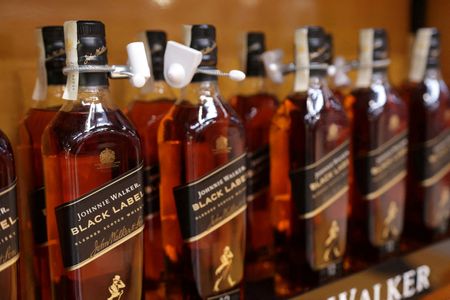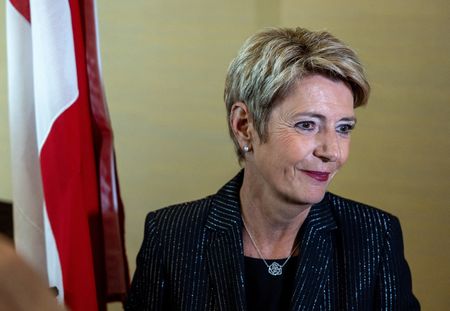By Jan Strupczewski and Julia Payne
BRUSSELS (Reuters) -The European Union still expects turbulence in trade relations with Washington, but it believes it has a good insurance policy thanks to a framework deal that covers most goods it exports to the U.S. by a maximum 15% tariff, an EU official said.
With the new rates set to enter into force in a couple of days, the 27-nation bloc, which is the U.S.’s biggest trading partner, is still waiting for executive orders that would bring down the tariff on some products, including cars and car parts, down to the agreed 15% rate.
A senior EU official said he expected that to happen “very soon”.
“We do expect further turbulence, but we have a clear insurance policy – the 15% tariff across the board. If the U.S. administration does not stick to that, we have the means to react to that,” the official told reporters.
“The situation requires management, we have not solved everything in one go, but we have a solid foundation, we have changed fundamentally the approach with the U.S. Others are in a far worse position,” the official said.
The EU-U.S. agreement leaves many questions open, including tariff rates on wine and spirits.
Talks on a joint statement with the U.S. that will spell out more details are very advanced, with the text broadly ready and the EU waiting for a response from Washington to finalise things, the official said. He declined to give a timeline for its release.
The 15% tariff that European Union goods face when entering the United States is all-inclusive, unlike the deals some other countries have struck with Washington, the EU official said.
For instance, while cheese exported to the U.S. from the EU will face a 15% tariff, UK cheese, once all tariffs are included, will face a tariff of more than 24%, he said.
‘BEST AVAILABLE’
“What we have obtained in our deal is the best available treatment,” the EU official told reporters, while adding that the 27-nation bloc was not celebrating the 15% rate, but that it considered it was a very good deal compared to others.
Tariffs on pharmaceuticals and semiconductors are currently zero, but if they rise as a result of a U.S. probe into imports of those products, they will not exceed the 15% ceiling.
Discussions on steel are taking longer due to the need to address volume-related issues, he said.
The EU is also working to finalise a list of essential products that will be exempt from U.S. tariffs, a process the official said will take some time. The EU is trying to get as many products as possible into the list of tariffs exemption, at a zero-for-zero rate.
The head of France’s wine and spirits exporters federation said he was still hoping for a U.S. tariffs exemption on those products.
“We are 48 hours away from a decision, and we have not lost hope that wines and spirits can be exempted,” Gabriel Picard, head of the FEVS wines and spirits exporters federation, told France Inter radio on Tuesday.
Investor sentiment in the euro zone unexpectedly tumbled in August in one of the first indications that the business community is unimpressed with the EU’s trade deal, a survey showed on Monday.
Meanwhile, German engineering orders fell 5% in June compared with a year earlier, with dips in both domestic and foreign demand reflecting uncertainty caused by the trade tensions, engineering association VDMA said.
France and Germany are among EU countries that have said the bloc had been too weak during trade negotiations with the United States and it should become stronger.
(Reporting by Jan Strupczewski, Julia Payne, Sudip Kar-Gupta; Writing by Ingrid Melander; Editing by Alison Williams)









